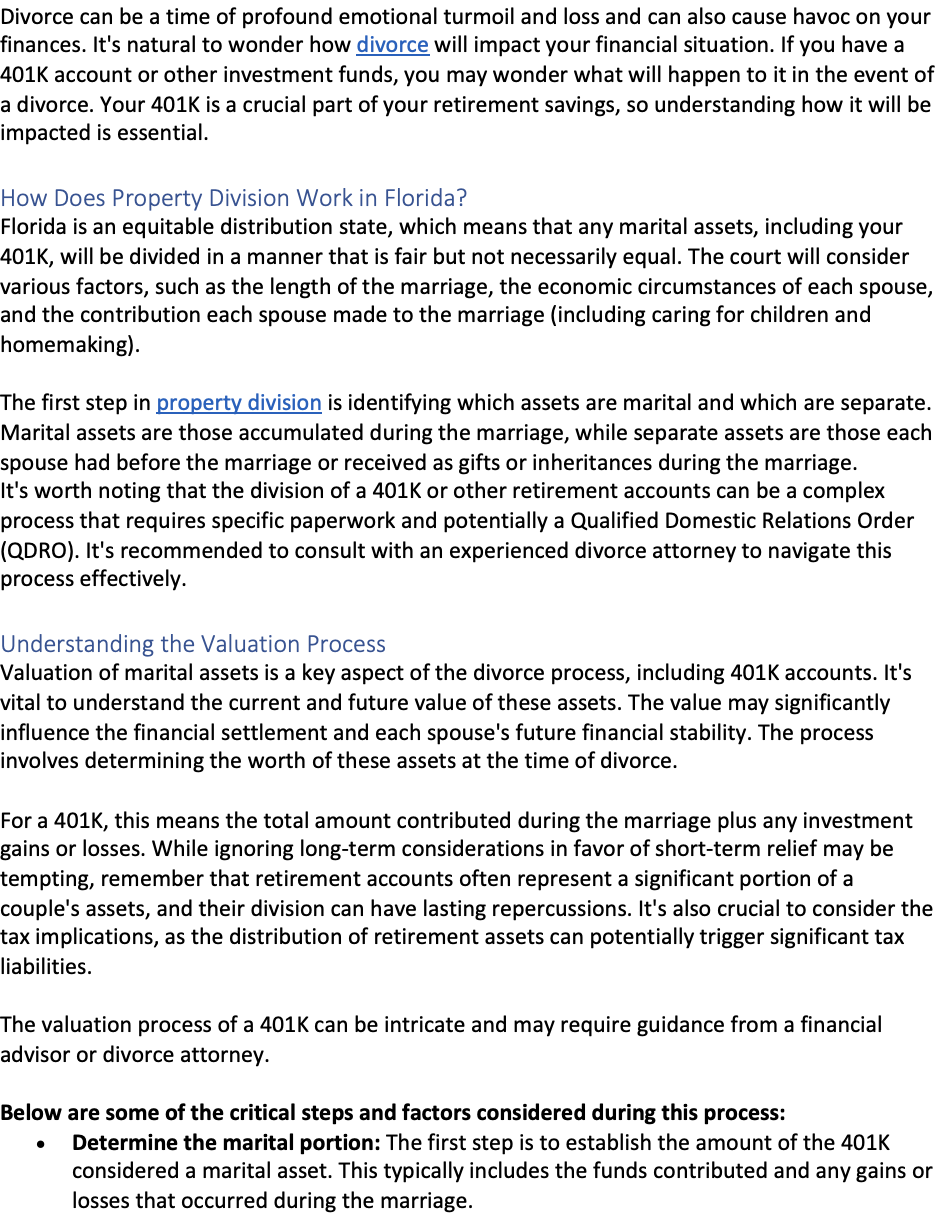
Divorce can be a time of profound emotional turmoil and loss and can also cause havoc on your finances. It's natural to wonder how divorce will impact your financial situation. If you have a 401K account or other investment funds, you may wonder what will happen to it in the event of a divorce. Your 401K is a crucial part of your retirement savings, so understanding how it will be impacted is essential.
How Does Property Division Work in Florida?
Florida is an equitable distribution state, which means that any marital assets, including your 401K, will be divided in a manner that is fair but not necessarily equal. The court will consider various factors, such as the length of the marriage, the economic circumstances of each spouse, and the contribution each spouse made to the marriage (including caring for children and homemaking).
The first step in property division is identifying which assets are marital and which are separate. Marital assets are those accumulated during the marriage, while separate assets are those each spouse had before the marriage or received as gifts or inheritances during the marriage.
It's worth noting that the division of a 401K or other retirement accounts can be a complex process that requires specific paperwork and potentially a Qualified Domestic Relations Order (QDRO). It's recommended to consult with an experienced divorce attorney to navigate this process effectively.
Understanding the Valuation Process
Valuation of marital assets is a key aspect of the divorce process, including 401K accounts. It's vital to understand the current and future value of these assets. The value may significantly influence the financial settlement and each spouse's future financial stability. The process involves determining the worth of these assets at the time of divorce.
For a 401K, this means the total amount contributed during the marriage plus any investment gains or losses. While ignoring long-term considerations in favor of short-term relief may be tempting, remember that retirement accounts often represent a significant portion of a couple's assets, and their division can have lasting repercussions. It's also crucial to consider the tax implications, as the distribution of retirement assets can potentially trigger significant tax liabilities.
The valuation process of a 401K can be intricate and may require guidance from a financial advisor or divorce attorney.
Below are some of the critical steps and factors considered during this process:
- Determine the marital portion: The first step is to establish the amount of the 401K considered a marital asset. This typically includes the funds contributed and any gains or losses that occurred during the marriage.
- Value at the date of separation: The value of the 401K on the date of separation is often used as a benchmark. Any contributions made after this date are usually considered separate property.
- Employment of a QDRO: A Qualified Domestic Relations Order (QDRO) may be utilized to divide a 401K. This legal order specifies the portion of the 401K to be awarded to each spouse.
- Consideration of financial and tax implications: It's essential to consider the tax implications of withdrawing from a 401K before the age of 59.5, as it could incur a 10% penalty on top of regular income tax.
- Impact of loans against the 401K: If loans have been taken against the 401K, this will affect the account's overall value.
- Possible future value: Consideration should also be given to the account’s potential for future growth.
Remember, navigating the intricacies of property division in a divorce can be complex. It's recommended to enlist the help of a professional to guide you through the process.
Division of 401K Assets
The division of 401K assets is a significant part of the property division process during a divorce. How the 401K assets are divided will depend on various factors, including the length of the marriage, the contributions made by each spouse, and the state laws governing the divorce.
There are generally three ways a 401K can be divided during a divorce:
- Splitting the account: The 401K is divided between the spouses, often according to the proportion of the marriage's duration that coincided with the contributions. A QDRO typically achieves this, with each party receiving their agreed-upon percentage.
- Buying out the spouse: One spouse may decide to keep the entire 401K and offer other assets equal to the value of the other spouse's share. These assets could include cash, real estate, or other investments.
- Leaving the account intact: If the spouses agree, they might leave the 401K intact, with one spouse retaining the rights to the funds. This option is usually considered when the spouses are close to retirement age or if the 401K is a minor part of the couple's total assets.
Regardless of the division method chosen, it's crucial to understand the potential tax implications. Withdrawals from a 401K are subject to income tax, and if withdrawn before the age of 59.5, an additional 10% penalty may apply. It's advisable to seek advice from a financial advisor or a divorce attorney to ensure the best possible outcome for your financial future.
The division of 401K assets can sometimes lead to disputes and disagreements. It's critical, therefore, to approach this process with an open mind and a readiness to negotiate. Remember, an equitable division of assets is the ultimate goal in this process, and it might require some compromise on both sides.
Protecting Your Retirement
Protecting your retirement savings amidst a divorce can feel daunting, but with a thoughtful approach and sound advice, it's possible to navigate this process successfully.
Here are some strategic tips to consider:
- Consult an experienced divorce attorney: Divorce is not just an emotional roller coaster; it’s a complex legal process with significant financial implications. Seek advice from a knowledgeable attorney who understands the intricacies of dividing retirement assets, tax implications, and the impact on your long-term financial health.
- Understand your rights: Become familiar with the laws in your state regarding the division of retirement assets. This knowledge will empower you to make informed decisions and help avoid costly mistakes.
- Use a QDRO: When dividing a 401K, using a Qualified Domestic Relations Order (QDRO) is critical. This legal document allows funds to be transferred to an ex-spouse without triggering early withdrawal penalties.
- Consider the tax implications: Any division of retirement assets should be done with a clear understanding of the tax consequences. Withdrawals from a 401K are generally taxable, and early withdrawals could be subject to penalties.
- Don't rush decisions: It's understandable to want to expedite the divorce process, but rushing decisions about asset division can lead to unfavorable outcomes. Take the time to understand the short and long-term implications of your decisions.
- Keep emotions at bay: Emotional decision-making can lead to financial missteps. As difficult as it may be, try approaching the division of your assets, including your 401K, with a clear, rational mindset.
- Consider mediation or collaborative divorce: These processes allow couples to work out the terms of their divorce together instead of leaving decisions up to a judge. This can lead to more mutually beneficial outcomes and could be particularly helpful when dealing with complex financial matters like the division of a 401K.
By implementing these strategies, you can help safeguard your retirement savings, ensuring a secure financial future as you embark on this new stage of your life.
At K. Dean Kantaras, P.A., we understand the emotional and financial toll divorce can bring, especially when significant assets, such as a 401K, are involved. Our team of experienced attorneys is equipped to guide you through the complexities of property division with compassion, knowledge, and skill. We're versed in Florida's intricate laws governing asset division and can help you identify and value marital and separate assets to ensure an equitable distribution.
Using a personalized approach, we delve into the details of your financial situation to provide advice tailored to your specific situation and objectives. We're committed to helping you understand all the potential tax implications and potential financial consequences of dividing your retirement assets.
We believe in empowering our clients. We will provide you with the knowledge and resources you need to make informed decisions about your future. If disputes arise, we're prepared to negotiate robustly on your behalf, always prioritizing your best interests. Whether through mediation or collaborative divorce, we strive to help our clients achieve fair resolutions that protect their financial health. At K. Dean Kantaras, P.A., we're not just providing legal services but partnering with you on the path to a secure financial future post-divorce.
If you are considering filing for divorce or have already begun the process, contact us today by calling (727) 939-6113 or fill out our online form to set up a consultation.

